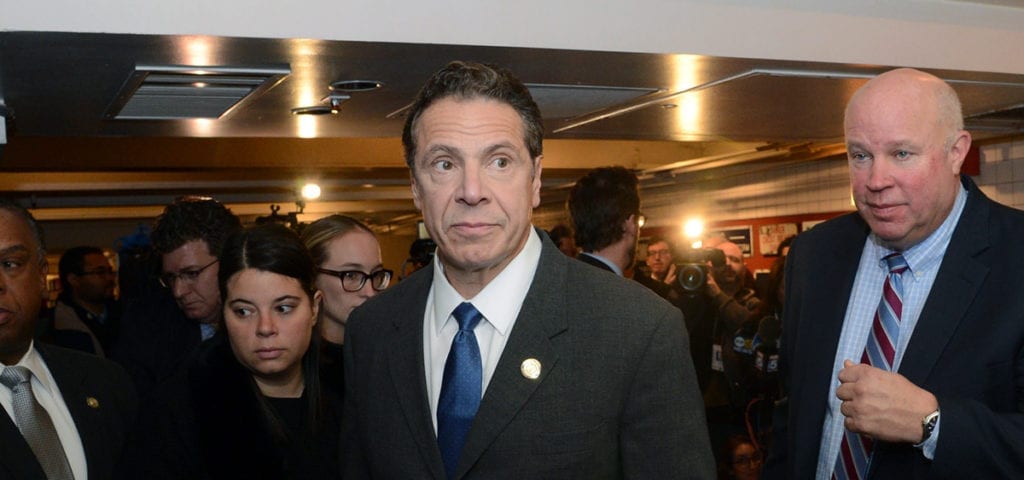The governor’s inclusion of legalization revenues for his 2021 budget suggests that sales could launch in New York by 2020.
Legalization Included in New York Gov.’s Budget

Full story continued below.
Advertisement
New York Gov. Andrew Cuomo on Tuesday outlined his support for adult-use cannabis legalization in the state, estimating it would reap $300 million in tax revenues which would be deposited into the “Marihuana Revenue Fund” after enforcement costs and funds for alcohol and drug abuse programs.
During his combined state of the state and budget address, Cuomo indicated New York’s law would seek to “stop the disproportionate impact on communities of color and … create an industry that empowers the poor communities that paid the price and not the rich corporations who come in to make a profit.”
It’s an about-face for Cuomo who last February called cannabis a “gateway drug.”
According to the governor’s Executive Budget, more than 800,000 people have been arrested in the state for low-level possession “with the majority…people of color.”
A memoranda in support supplement to the budget released shortly after the Democrat’s remarks included the “Cannabis Regulation and Taxation Act,” sponsored by fellow Democrat Sen. Liz Krueger. The measure, currently in the upper chamber’s Finance Committee, would implement a taxed and regulated market for adults along with a host of other reforms; however, in order to ensure the law is signed once it reaches Cuomo’s desk, the home-growing provisions included in the current proposal would likely be struck from the legislation. In November’s election, the Democrats gained control of the Senate, giving the party control over the legislature.
The memorandum calls the enactment of the legalization bill “necessary to implement the [fiscal year] 2020 Executive Budget because it would increase All Funds revenue by $83 million in FY 2021, $85 million in FY 2022, $141 million in FY 2023 and $184 million in FY 2024.”
“I am glad that the Governor has embraced the necessity of ending the prohibition on adult-use marijuana. In recent months I have worked with his office, sharing what I have learned over several years working on this issue,” Krueger said in an email. “As always, the devil is in the details, and I look forward to a close examination of his proposal when the language of the Executive Budget is released.”

The current language of the bill
The current measure, which moved into the finance committee in November, would allow a six-plant home grow and outlines penalties for unlicensed growing ($125-$500 fines), sales, and selling to minors (a class E felony). It would allow massive personal possession limits – up to two pounds of flower and four-and-a-half grams of concentrates; these limits, however, could also be affected in order to for the measure to receive the governor’s approval.
The measure also provides for municipal control and seed-to-sale product tracking, both included in the governor’s memorandum.
“Existing laws have been ineffective in reducing or curbing [cannabis] use and have instead resulted in devastating collateral consequences that inhibit an otherwise law-abiding citizen’s ability to access housing, employment opportunities, and other vital services,” according to the bill text. “Existing laws have also created an illicit market which represents a threat to public health and reduces the ability of the legislature to deter the accessing of [cannabis] by minors. Existing marihuana laws have also disproportionately impacted African-American and Latino communities.”
During his address, Cuomo promised the state’s cannabis industry would help the poor communities adversely affected by prohibition rather than the corporations.
As proposed, the measure includes social-equity provisions for both minorities and women, implementing a social-equity incubator for women and minorities. The plan defines social equity applicants as: “a member of the community group that has been disproportionately impacted by prohibition; has an income lower than 80 percent of the median income of the county in which the applicant resides; and was convicted of a cannabis-related offense prior to the effective date of the bill.”
The incubator program would provide “support to social equity applicants after they have been granted licensed…in the form of counseling services, education, small business coaching and compliance assistance.”
Additionally, it would block cannabis odor or possession of two pounds or less from constituting “reasonable suspicion of a crime or be used as evidence in any criminal proceeding.”
The bill would create nine licenses — nursery, producer, processor, distributor, retailer, microbusiness, on-site consumption, delivery, and testing — while implementing three taxes.
The first tax would be imposed on cannabis cultivation at a “rate of $1 per dry weight gram of cannabis flower and $0.25 per dry weight gram of cannabis trim,” according to budget documents. The second tax would be imposed “on the sale by a wholesaler to a retail dispensary at the rate of 20 percent of the invoice price.” The third tax would be “imposed on the same sale by a wholesaler to a retail dispensary at the rate of 2 percent of the invoice price but collected in trust for and on account of the county in which the retail dispensary is located.” Business registration fees and bi-annual renewal fees would be set at $600.
The proposal would move supervision of the state medical cannabis program to the newly created Office of Cannabis Management – the same agency that would supervise the recreational program – and would allow registered medical patients to grow up to four plants, according to a member of the governor’s office in an email. There are no home-growing provisions under the current medical cannabis law and flower products are unavailable to registered patients.
In an email, Vireo Health CEO Ari Hoffnung said, “until the official legislation is released it is hard to be sure how the bill will impact existing medical cannabis producers.”
Vireo operates four dispensaries throughout the state in Albany, Johnson City, White Plains, and Queens.
“Gov. Andrew Cuomo’s proposal represents an historic step toward ending the decades-long war on drugs that has unjustly targeted communities of color, bringing substantial tax revenue to the state, and creating an environment in which New Yorkers have safe and legal access to marijuana,” he said. “With that said we need to study the impact this legislation will have on our vertically integrated medical marijuana program, in which companies cultivate, process and dispense these life-changing products.”
New York Republicans have their own plans for cannabis revenues
In a “pre-buttal” prior to the governor’s remarks, Republicans – now the minority party in both legislative chambers – said they would like cannabis revenues to be used for tax relief, “not to fuel more spending.”
In an interview with Spectrum News, Deputy Minority Leader Joe Griffo said the tax windfall could reduce both property and income tax rates in the state. Griffo compared the legalization proposal to another ‘sin’ industry newly legalized in the state – casino gambling.
“When they told us that legalizing gaming would be an economic cure for upstate New York, we now know these casinos are looking for bailouts and help,” Griffo said in the interview.
Once approved, New York would be the eleventh state to legalize cannabis for adult use, along with Washington, D.C. Two of New York’s border states – Vermont and Massachusetts – have legalized cannabis use for adults along with Canada, which borders the state to the north. New Jersey is also expected to legalize sometime in 2019.
There is no timeline for when the bill will move out of the finance committee, what amendments could be made, or when sales would begin; however, with Cuomo including revenues from the market in his 2021 budget, sales could commence in 2020 if lawmakers pass the legislation this session.
NORML, in their recent gubernatorial scorecard, graded Cuomo a B-plus on cannabis policy.
Get daily news insights in your inbox. Subscribe
End
